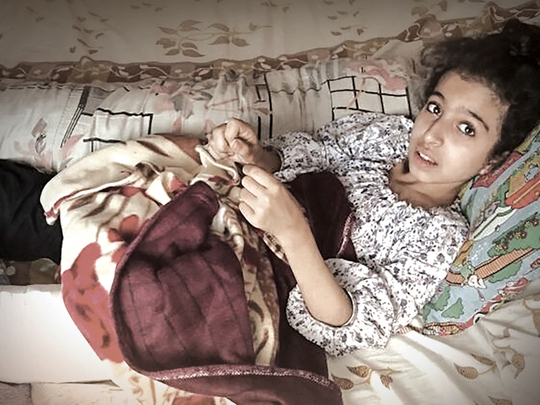
Last week, thousands of people around the world shared the image of five-year-old Omran Daqneesh, who was pulled from the rubble of his home in Aleppo, Syria. But fewer shared news that his ten-year-old brother had died from injuries sustained in an air strike, and even fewer know the names of Gina (pictured on the right) and Nagham, my nieces, aged eight and 10, respectively, who were shot by a sniper in Madaya, southern Syria, three weeks ago, while drinking water from a spring. Madaya is a small town in the Damascus countryside that has become a haven for displaced people during this war. In June last year, the Syrian regime, supported by Hezbollah militias, attacked the nearby town of Zabadani, causing a huge wave of people to flee to Madaya. We now have 35,000 displaced people living there, which is around three times the usual number of residents.
People have been trying to grow vegetables to feed the expanded population, but these attempts have been doomed to fail because of an acute water crisis in the region. The fresh-water network is completely disrupted because of shelling. This means the only way to obtain fresh water is by buying very expensive tanks of it or to transport it in plastic containers or gallon-tanks fed by plastic pipes laid from springs in the town. There are three freshwater springs nearby, including the Bukain spring, which the regime and the Hezbollah militias are trying to gain control of — sniper fire is aimed at anyone trying to approach.
Our town has become a pawn; used by the regime to put pressure on opposition fighters, the Free Syrian Army. One of those victims was my niece. According to the doctor’s report, the bullet that hit Gina shattered her thigh bone. For eight days, our family listened to Gina’s screams as she suffered without painkillers. She was crying and begging someone to relieve the pain: “I cannot bear the pain ... it was not my fault, I was only going to drink water. I want to run and play like other children do and I want to be able to walk again. I don’t want them to cut my leg off. I promise you I will come back to Madaya after the operation. I just want you to get me out of here.”
In Zabadani, the roads leading to us have been blocked with barriers and barbed wire. Mines were laid in the surrounding agricultural land, preventing food and medical supplies. This has led to a serious food and health crisis. More than 180 people have died from hunger, a shortage of drugs and medical supplies, or have been killed by mines or sniper fire while attempting to flee. The siege has lasted 500 days so far, despite a truce that began in September, which has slowed the bombing and allowed some humanitarian aid to get through. However, the blockade is still in place and the aid that has reached us is not nearly enough.
Madaya today has not received any aid for more than 100 days. Everyone, without exception, is suffering from a shortage of calcium and many are malnourished and anaemic. Recently, more than 45 cases of typhoid were recorded, most of them among women and children, and there are no drugs or antibiotics available.
We are lucky enough to have family members in the United Kingdom and through their help, we managed to launch an international campaign to get Gina the medical assistance she needed. She was eventually evacuated to Damascus via the Syrian Red Cresent. My family and I were hugely relieved, but tension spread when other families with ill children discovered that Gina would be evacuated from Madaya, while their loved ones would not. Some in the town said Gina couldn’t leave alone without other children being evacuated. After intense negotiations with our family and the Hezbollah militias, Gina was evacuated in the middle of the night.
The next day, we tried to keep our good news quiet, but news travels fast in a besieged town. In the following days, I was bombarded with requests from other Madaya residents to help their children. Thankfully, the humanitarian groups that had helped us continued to put pressure on the regime to evacuate 14 other children in need of urgent care, including 11-year-old Yemaan who had been diagnosed with meningitis. And last Friday, the Syrian Red Crescent was able to rescue 36 children from Madaya and rebel-held Foaa and Kefraya.
But after Omran, Yemaan and Gina, what next?
The situation in Madaya is only getting worse and many more children will get ill. I’m convinced many will die if the siege is not broken. Winter is coming and many are spending what little they have been stocking up on fire wood and dried beans.
Everyone is worried about the coming months, there are very few supplies and the entire town is relying on more aid to make it in. We urge the United Nations to keep getting food parcels into us — especially flour, rice and milk for the babies. We are all hostages of the regime’s war game and we just want to be free to go. Don’t forget us, world. We are living in an open-air prison. Don’t forget Madaya.
— Guardian News & Media Ltd
Sereen Bakr is a pseudonym. Additional reporting by Fadah Jassem.










